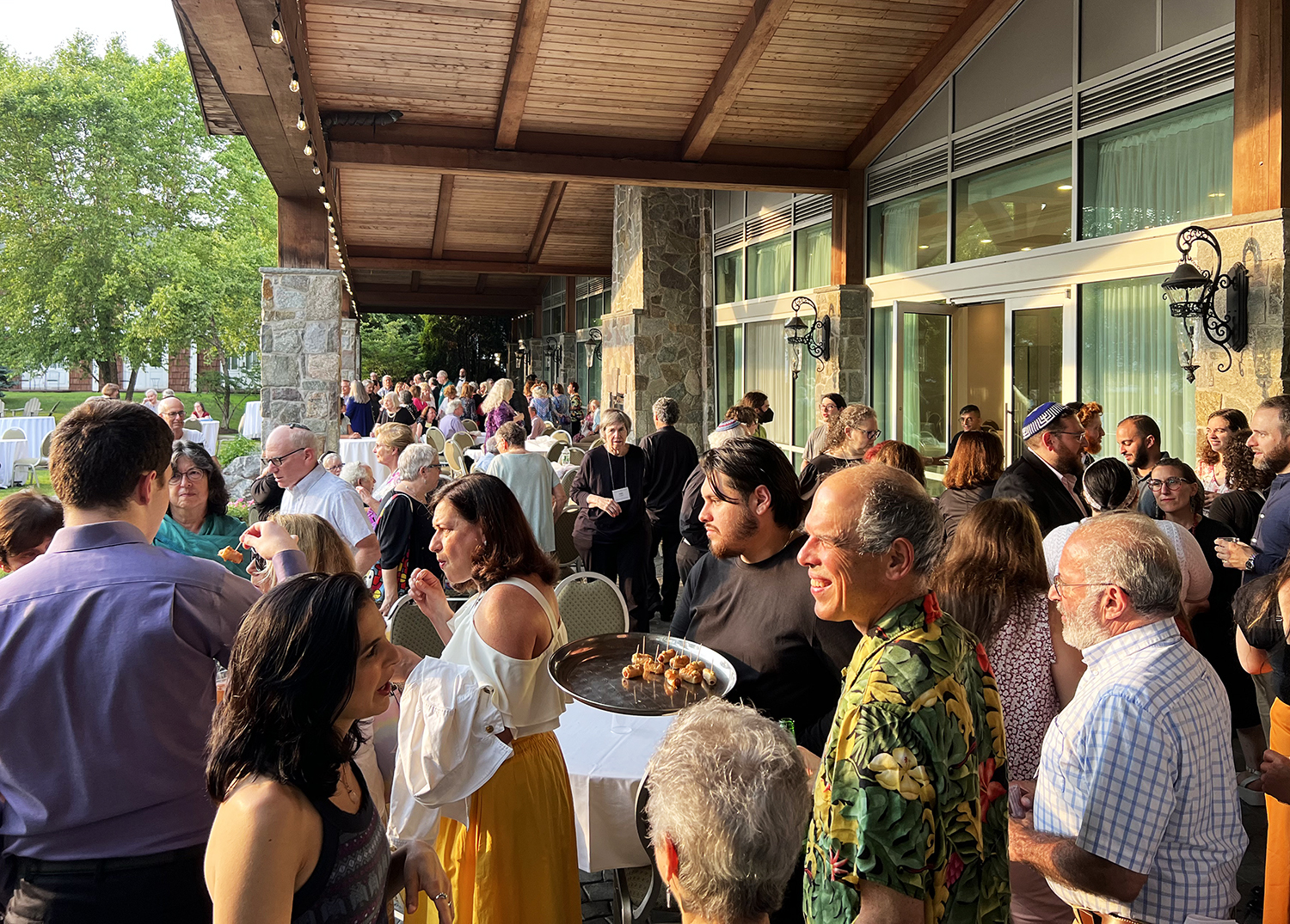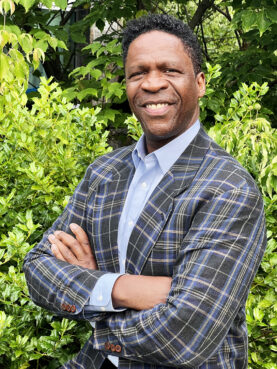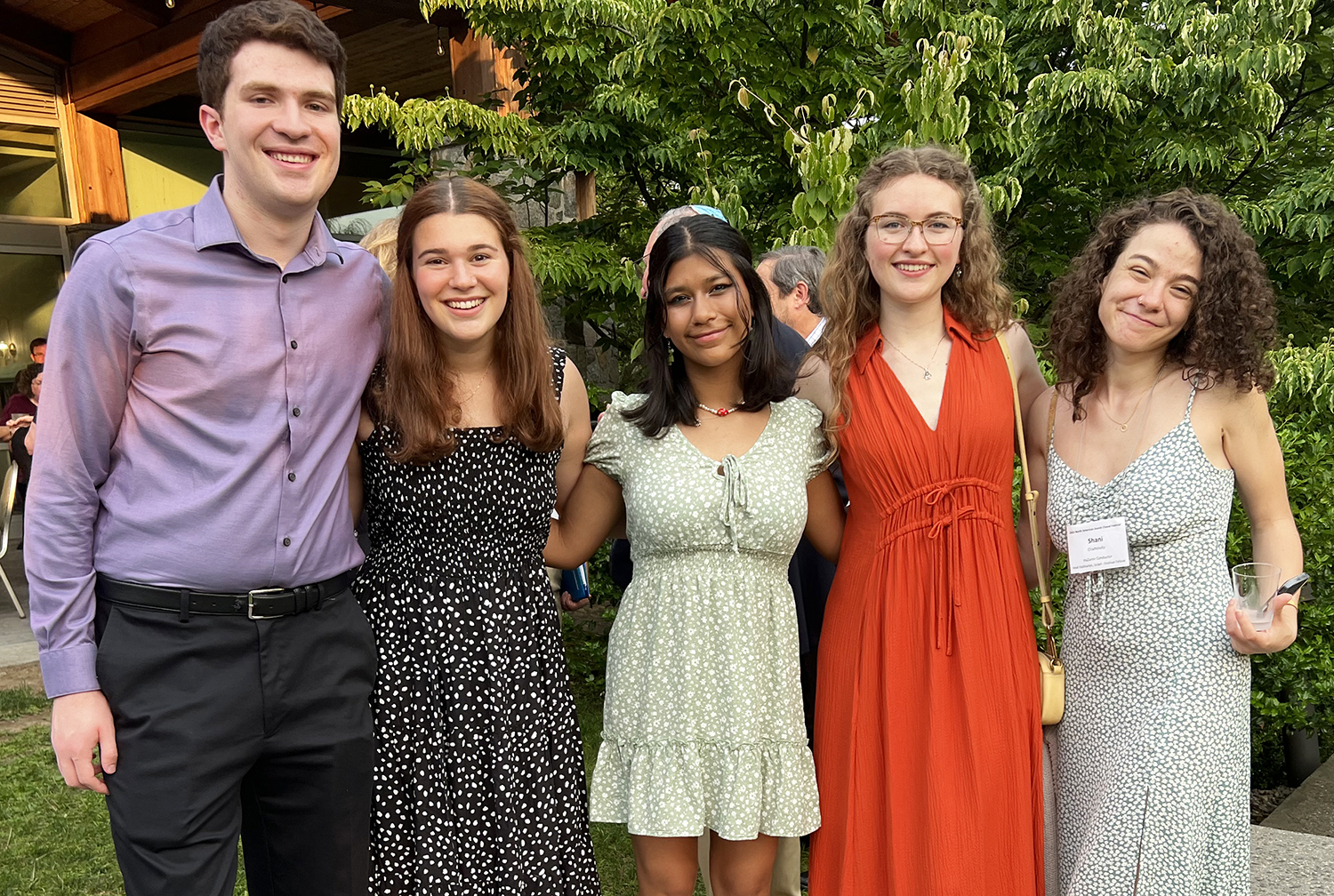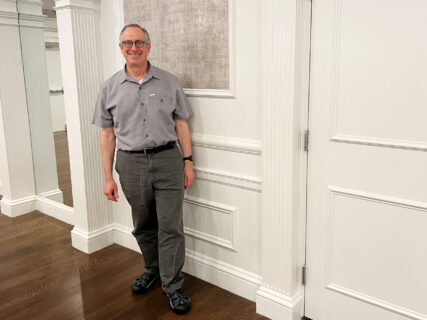TARRYTOWN, NEW YORK (RNS) — Twenty-two-year-old soprano Shani Chamovitz flew in on a 10-hour flight from Israel, landing at Newark Airport at 3:30 a.m. on Sunday for the annual North American Jewish Choral Festival, held this year in Tarrytown, New York. She didn’t get much sleep but said the hassle was worth it.
“It’s been life changing for me,” said Chamovitz, who attended for the first time last year. “It was an amazing experience, singing with such a range of people of all ages, beliefs, outlooks on life and outlooks on Judaism. But it was mostly the musical part of it, and the conducting workshops, that gave me so much.”
The festival is jokingly described by several attendees as “Brigadoon for Jewish choral singers” — a reference to the 1947 musical about a magical town where time essentially stands still.
“Every summer we get back and it’s like there was never a year in between,” said longtime attendee Steve Cohen from Larchmont, New York.
For five packed days from July 9-13, singers attended a slew of workshops on music and Judaism, rallied together for informal community sings, attended nightly professional-level concerts and formed “instant” choirs on site organized by sight-reading skill. Hallways of the Sleepy Hallow Hotel where the festival took place in Tarrytown were abuzz with conversations and choral music floating in from the nearest rehearsal room. The festival is unique not only because of the sheer number of Jewish singers all in one place — there were roughly 400 throughout the week — but because it brings together Jewish people (as well as some non-Jewish ones) of all ages, abilities, religious beliefs and political affiliations.

Festival attendees gather outside of Sleepy Hallow Hotel in Tarrytown, New York, for a cocktail reception. RNS photo by Kathryn Post
“It’s a place where everyone is forgetting about things that tear us apart or divide us, because everyone’s singing great music together,” said Matthew Lazar, founder of the festival.
Lazar, affectionately called “Mati” by festival goers, was raised in a modern Orthodox family in Brooklyn where he grew up playing piano from age four, watching the Brooklyn Dodgers and learning the music of Jewish composers. In 1990, he founded the Zamir Choral Foundation, an organization dedicated to expanding Jewish choral activity. Nobel laureate and Holocaust survivor Elie Wiesel, who conducted a choir in France after World War II, was a longtime president of the foundation.
Lazar also founded the North American Jewish Choral Festival in 1990, an immersive event he envisioned as a venue for gathering hundreds of Jewish choral singers and conductors from across different cities.
Over two decades later, Lazar, who planned this year’s event alongside coordinating committee members Rabbi Daniel Freelander and Jewish music scholar Marsha Bryan Edelman, remains a driving force of the festival. He directs the top-level instant choir, and at a Wednesday night concert he conducted the Zamir Chorale and Zamir Noded choirs, both of which are part of the Zamir Choral Foundation. Audience members swayed, wept, hummed along and responded to the program, sung almost entirely in Hebrew, with multiple standing ovations.

Edward Pleasant, professional baritone and conductor of Hallel B’Shir (Praise in Song) choir from Temple Israel of Northern Westchester in Croton-On-Hudson, New York, is a Christian who first attended the festival in 2018. RNS photo by Kathryn Post
“He’s the godfather of Jewish music,” professional baritone and attendee Edward Pleasant told Religion News Service.
Chamovitz pointed to Lazar as the catalyst for her emerging conducting career. Lazar and his wife, Vivian Lazar, invited Chamovitz to be a conducting fellow at last year’s festival, setting her up with specialized trainings and one-on-one coaching sessions. At the Lazars’ encouragement, after the 2022 festival she took on the role of conductor for the Ashkelon chapter of HaZamir, the international teen choir affiliated with the Zamir Foundation, in Ashkelon, Israel. In one year, Chamovitz grew the chapter from one to 10 participants. She hopes to conduct full time one day.
Saydie Grossman, 18, from Long Island, is also in her second year at the festival. She relishes the camaraderie among attendees.
“I really just love how intergenerational this is,” Grossman told Religion News Service. “I feel like even outside of the rehearsal spaces at lunch, when we’re all sitting around a table or at the workshops, I’m really asked to reflect on myself as a young Jewish adult.” She added that there’s a shared humor among the group. “You don’t have to explain what you mean when you say, ‘this meshugenah.’ You don’t have to explain the Yiddish words.”
The entire festival is designed with Jewish participants in mind, from the kosher-only food options (Wednesday evening’s meal was a Mediterranean-inspired affair) to the daily prayer services in Reform, Orthodox and Conservative traditions. Lazar noted the festival is strategically scheduled during the week to avoid Shabbat.
“These are concerts or workshops or rehearsals, and even though some of these pieces might be used in a service, these aren’t services except to the extent that music is a ‘heilige Kunst,’ a holy art,” he told RNS. “Most of these people, I would have to say, are not in it for the religious experience, but for a spiritual experience … When people want to make music together, there’s a quest that’s metaphysical.”
Lazar’s observation rings true for Grossman, who sees singing Jewish choral music as a spiritual event anchored in generational memory.
“It really has this way of grounding and re-centering you, even if you’re not religious, even if you don’t go to shul, even if you don’t keep kosher, you can just listen to this music and be immediately taken by how beautiful and thoughtful and warming it is,” she observed.

Saydie Grossman, second from the left, and Shani Chamovitz, on the right, pose with friends during an outdoor reception at the festival. RNS photo by Kathryn Post
Though most attendees are Jewish, there are exceptions. Pleasant, a music minister at Stamford Church of Christ in Stamford, Connecticut, and conductor of Hallel B’Shir (Praise in Song) choir from Temple Israel of Northern Westchester in Croton-On-Hudson, New York, is a Christian and professional baritone who attended the festival for the first time in 2018. Though he said as a Christian and Black person he was initially nervous to attend, his Hallel B’Shir choir has been invited to perform at several festivals since.
Pleasant has enjoyed the breadth of Jewish music at the festival, from classical genres to blue grass, as well as the chance to network with composers and other conductors.
“I’ve met people whose music I’ve sung for years. And it’s just amazing just to get a name on a page, and then have that person actually sitting across from you,” said Pleasant.
One such composer is Gerald Cohen, also a cantor at Shaarei Tikvah at Scarsdale, New York, who attended Lazar’s instant ensemble rehearsal of his song “Lo Alecha Ham’lacha Ligmor” on Wednesday afternoon. The song, which repeats in Hebrew and English a well-known Jewish phrase from Pirkei Avot (Ethics of our Fathers) — “You are not required to finish the work, nor are you free to abandon it” — was commissioned in honor of health care workers, clergy and other first responders during the COVID-19 pandemic.

Gerald Cohen is a composer and a cantor at Shaarei Tikvah at Scarsdale, New York, who attended a choir rehearsal of his song “Lo Alecha Ham’lacha Ligmor.” RNS photo by Kathryn Post
“This is what composers live for: To have people who care about making music in a very passionate way to take that on and to do a beautiful job of it,” Cohen told RNS following Wednesday’s rehearsal.
As choirs begin to return to full strength after years of disjoined Zoom singing, masked choirs and socially distanced ensembles, many vocalists are more grateful than ever for the gift of choral singing. And that gratitude is almost palpable at the North American Jewish Choral Festival.
“Judaism is not just what goes on in your temple. There’s a whole spectrum of other things out there, and it’s fascinating to see,” said Steve Cohen (no relation to Gerald Cohen). “We get people of all sorts. We get very Orthodox people, people from the Conservative world, people from the Reform world, people who maybe aren’t religious at all, but love music. All these different people, there’s one thing we can agree on: The wonder and power of choral music.”

